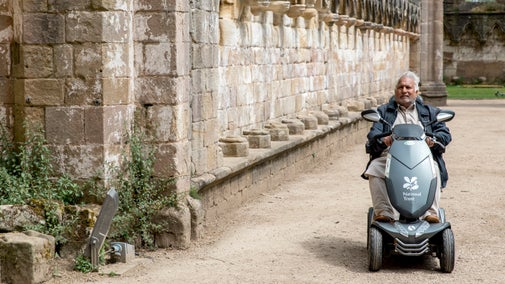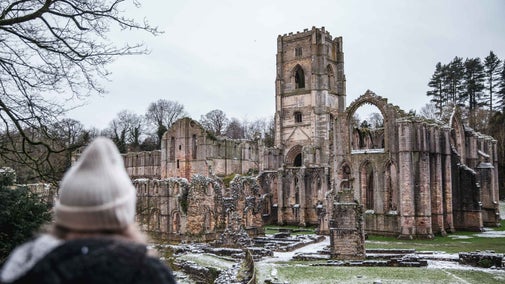
Discover more at Fountains Abbey
Find out when Fountains Abbey and Studley Royal Water Garden is open, how to get here, the things to see and do and more.

Discover Studley Royal, a landscaped 18th-century deer park in the Skell Valley near Ripon. Stroll alongside tranquil canals and ponds, visit the statues on the lawn and take to the High Ride path for views through the trees. Then see which species of deer you can spot at Studley Royal deer park.
Studley Royal is a water garden and has pools, canals and cascades fed from the river Skell. This is made up of deep running water, please don't paddle here. There are some gentle and steep slopes around the estate as well as uneven ground and height drops. We recommend wearing sturdy shoes when you visit.
Saturdays and Sundays at 1pm
Join our volunteer tour guides and disocver the secrets and surprises of Studley Royal Water Garden. Meet your guide at Porter's Lodge.
If you'd like to find out even more after your tour, you can meet your guide in the abbey cloister at 12pm where they'll be able to answer any of your burning questions and discuss the history of this estate in more detail.
Nestled within the Skell Valley near Ripon, this landscaped masterpiece was designed by John and William Aislabie in the 18th century.
While it's often thought that the magnificent abbey ruin is the reason for the World Heritage Site designation here, it's actually the water garden at Studley Royal.
Listed by UNESCO as 'one of the most magnificent Georgian water gardens ever created', Studley Royal is a landscape which has been artificially manipulated to such a standard as to be considered a 'feat of human creative genius'.
Fountains Abbey became part of this contemporary design as an ornament or ‘folly’ within the garden in 1767 when the two neighbouring estates were united. The official World Heritage Site designation is 'Studley Royal Park including the Ruins of Fountains Abbey'.
Follow the gentle banks of the River Skell down from the abbey to the garden which has been channelled into canals, cascades and tranquil moon ponds. The monks changed the course of the river up by the abbey, with the Aislabies continuing this work by crafting the reservoirs and channels to create a scenic landscape garden.
You walk out onto a sprawling green lawn, decorated with statues dotted around tranquil moon ponds. Stroll around the ponds and down the canal to see the statues up close.
Make the climb up to the High Ride path through the dark Serpentine Tunnel. There are more follies to explore and far-reaching views. Don't worry – once you're up, it's worth the climb. Find three more follies along the winding woodland path and discover the views through the trees, ever changing with the seasons.
Studley Royal deer park was declared Yorkshire’s first World Heritage Site in 1986, and is set beside the ruins of the Cistercian abbey. It once contained the Tudor manor house known as Studley Royal House, but this was largely destroyed by fire in 1716. Although rebuilt about 50 years later, this too was damaged by fire in 1946 and demolished shortly afterwards. Today all that remains is the impressive stable block, built between 1728 and 1732, which is now a private residence.

Find out when Fountains Abbey and Studley Royal Water Garden is open, how to get here, the things to see and do and more.
We want to make sure that Fountains Abbey and Studley Royal is accessible for all visitors. Discover how we can help you make the most of your visit to Fountains Abbey and Studley Royal.

The ruins of Fountains Abbey are truly something to behold. Discover what to see when you come face to face with some of the oldest abbey ruins in the country.

Step back into a dramatic past and imagine what life would have been like for the monks lived here, and learn how Fountains Abbey and Studley Royal became one.

Fountains Abbey is a three pawprint rated place. Discover why it's such a great place to bring your dog and take a look at our top tips to help you make the most of your visit.

Join one of our volunteer tour guides to discover more about the largest monastic ruins in the country.
